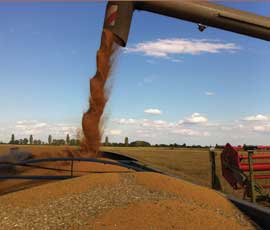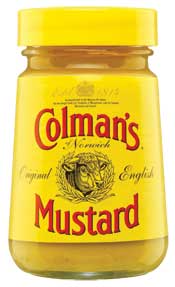Collaborative approach cuts the mustard

Collaboration between grower and processor has secured the future of English mustard growing for Colman’s in the run up to its 2014 bicentenary. Suzie Horne discovers how this came about
Following a disastrous harvest in 2007, the few remaining field-scale growers of English mustard were disillusioned with the crop.
Investment in variety development was desperately needed. The old seed stock upon which growers had been relying was losing its vigour and there were also agronomy challenges, says grower Michael Sly.
“We were having no end of harvesting problems. The price was dismal and we were getting poor yields – it looked like the end of mustard growing for Colman’s on any scale in England.”
However, mustard growers tend to be long-term producers of the crop. Some of the farming families supplying Colmans had been doing so for well over 100 years and that tradition meant there was a reluctance to give up on the crop altogether. But something needed to happen to restore confidence and secure supplies.
Crop profitability and quality were the challenges, along with maintaining the competitiveness of the supply chain and production.
Richard Self, training & development, and regional manager at the European Food and Farming Partnerships consultancy was invited by the growers to sit in on an initial meeting with Colman’s parent company Unilever to investigate how they could move things on.
The outcome of that meeting was the appointment of EFFP to analyse mustard growing costs, to compare mustard with other break crops and to draw up a feasibility study for the formation of a grower group. The trading relationship between growers and the processor was also reviewed.
 The formation of English Mustard Growers (EMG) followed, with a business plan for how the group should operate. The review of the trading relationship between grower and processor resulted in new contract terms. These included growers taking control of seed development and agronomy, with the price they received reflecting these costs, as well as a tighter specification to assure delivery of a clean crop.
The formation of English Mustard Growers (EMG) followed, with a business plan for how the group should operate. The review of the trading relationship between grower and processor resulted in new contract terms. These included growers taking control of seed development and agronomy, with the price they received reflecting these costs, as well as a tighter specification to assure delivery of a clean crop.
Luckily, some sound seed from 1995 was found. This had been one of the best ever yielding years. Seed development, production and storage was contracted to Elsoms, while an agronomy service is provided to the group by Farmacy.
Three harvests have now been cut since the group was formed and although inherently volatile, yields are improving steadily. “It’s not putting it too strongly to say that this has probably rescued the English mustard crop,” says Mr Sly.
“From where we used to be compared with now, I’d say we’re getting a fair price. It’s not just a question of the financial investment, but also of the time and goodwill that growers have put in to make this work, we don’t want to lose that.”
Currently, about half of the mustard supply for the UK is home grown, with most of the remainder coming from Canada. The group has its sights on pushing that share up to about two-thirds or even three-quarters.
The group can supply about 1,400 to 1,500t of seed a year, split roughly equally between brown and white mustard. All but one of the current group members are based on fenland in north Cambridgeshire and south Lincolnshire.
Profitability has improved and, as a break crop, mustard generally competes well with oilseed rape, peas and beans, although the current high price of oilseed rape is challenging that relationship at present, says Mr Sly. The crop fits in particularly well with a potato rotation.
Colman’s’ dry foods and crops manager Bob Walpole is also pleased with the progress in yields, seed quality and reliability since the group was formed. Previously, factory losses in mustard seed had been high.
Administration of the group is carried out by members, which helps to keep costs to a minimum. Individual group members take responsibility for specific areas such as contracts, cleaning and drying, transport, seed and agronomy liaison. Transport is run on a single tender, giving growers a more competitive service.
One crop contract is negotiated for the whole group with Colman’s, making negotiation, organisation and administration easier and cheaper.
There have been unexpected benefits apart from the security, improved organisation, planning and returns which the group has brought.
“The really great thing is that this has brought farmers together who probably knew each other by acquaintance, who all feel ownership and feel part of this. We want to make it work.”
Colman’s has been understanding and supportive of the formation of the group, say the growers.
Three new growers have been taken on since the group was formed, bringing the total to 14 members, which, for the time being, is enough, says Mr Sly. “I would like to think we could expand the area in time and possibly supply some of the French requirements.”
Mr Self believes that having independent, third-party involvement in the form of EFFP helped build trust between Unilever and growers as the project progressed. Increasing transparency about growing costs and the issues faced by both grower and processor was an important part of this.
“They are all very busy people and haven’t the time to take it forward.” Having someone there to make things happen and put a timescale on developments helped move things forward, he says. Training for farmer directors of the group was also organised by EFFP.
In the initial stages when growing costs were being investigated, one of the surprises was in the wide range of approaches taken by growers to the crop, says Mr Self. “No one was growing it in quite the same way as anyone else.” Since then, the group has come together to discuss strategy and share techniques.
EMG was also helped by EFFP with its application for RDPE grant funding towards the cost of the cleaner and dryer, for which they got a 40% grant.
The mobile seed cleaner bought by the group will also be used for contract seed cleaning of other crops when it is not needed for the mustard crop, helping to defray the costs to members.
Benefits to growers
• Improved terms from processor
• Greater control over crop quality and more secure future
• Group negotiation
• Single transport contract saves time and cash
• Exchange of technical knowledge between growers
Benefits to Colman’s
• Security of supply through group commitment
• Improved quality = lower losses, lower processing costs
• Less administration through dealing with group rather than individuals
EFFP conference 2011
Farmers Weekly editor Jane King is a speaker at EFFP’s annual conference in London on 8 November.
With the theme “Understand and adapt to the volatile landscape”, sessions will cover:
• The challenge of expanding food production sustainably
• How farming and food businesses can become stronger by working together
• What are the innovators investing in?
To reserve a place, go to www.effp.com/conference. Alternatively email Sarah Moffat to book or for more information smoffatt@effp.com, tel 020 7213 0431.

